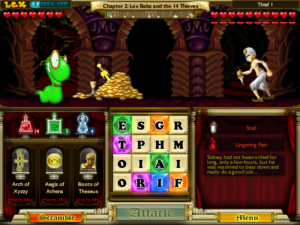Bookworm Adventures
 A long time ago, in the heyday of Ultima, I had an idea. I felt that the combat tactics of the CRPGs of the day were generally shallow and uninteresting, and should be replaced by something else. Like, say, chess. Combat mode was generally a distinct mini-game anyway, not sharing any mechanics with the exploration/NPC-interaction mode. It wouldn’t be standard chess, of course — different enemies would have different sets of pieces (including nonstandard ones whose movement rules the player might have to figure out from observation), there would be magic items that gave pieces special powers, and so on.
A long time ago, in the heyday of Ultima, I had an idea. I felt that the combat tactics of the CRPGs of the day were generally shallow and uninteresting, and should be replaced by something else. Like, say, chess. Combat mode was generally a distinct mini-game anyway, not sharing any mechanics with the exploration/NPC-interaction mode. It wouldn’t be standard chess, of course — different enemies would have different sets of pieces (including nonstandard ones whose movement rules the player might have to figure out from observation), there would be magic items that gave pieces special powers, and so on.
I never implemented this idea, mainly because writing a program that could play chess decently under the kinds of varying condition that it demanded was beyond my abilities. But the core idea isn’t really about chess specifically, it’s about replacing the D&D-inspired combat simulation at the core of most RPGs with something completely different — maybe even something that doesn’t even try to resemble a combat simulation — while leaving the RPG superstructure intact.
There have been a few recent games that play with this idea. PopCap’s Bookworm Adventures looks like the shortest and simplest of them. In fact, it’s simple enough that it barely has that RPG superstructure: it has experience levels and equipment slots, but no exploration, no choosing your battles or when you’re ready for them. You go through a linear series of levels, each of which consists of a set series of combat encounters ending in a boss. The only reason you’d ever repeat an encounter is because you died — and since dying just sends you back to the beginning of the level with one less healing potion and doesn’t affect your XP, I can imagine someone deliberately dying just to gain experience levels faster.
Within each encounter, you trade blows with a monster by making words out of a set of 16 tiles. In the simplest case, each tile you use does 1, 2, or 3 hit points of damage, depending on the letter, and once used, they’re replaced with random new tiles. The tiles are arranged onscreen in a 4×4 grid, but the arrangement is basically irrelevant, and you can think of it as an oversized Scrabble hand. And, indeed, some of the thought processes involved are similar to those in Scrabble. You don’t want a hand full of difficult letters, but you also don’t want to waste your turns making low-scoring words just to get rid of them.
There are complications. Long words are rewarded with special “gem tiles” that provide damage multipliers and other special effects when played (like weakening the enemy’s attacks, or causing it to skip a turn), so there’s an element of resource-management in deciding when to use them. You can also get gem tiles for overkill on your final blow against an enemy, so there’s some motivation to use damage multipliers just in the hope of getting a stronger damage multiplier.
Bookworm Adventures is of course based on Bookworm, which is more the sort of casual game that PopCap is known for. I played Bookworm some when it came out, and felt the same way about it that I feel about most PopCap games: it was amusing enough while I played the demo, but I didn’t feel compelled to register it. The central mechanics in Bookworm and Bookworm Adventures aren’t quite the same — the arrangement of tiles is actually significant in Bookworm, which means you spend a lot of time trying to set up high-scoring words by clearing tiles that are in the way. But even taking that into account, I think it’s interesting how different the Bookworm Adventures experience is simply as a result of the motivations. I’ve never cared much about high scores, 1Perfect scores, now, that’s something else. That’s a challenge to be met. But trying to beat your old record is just an activity. but completing quests, defeating bosses, and collecting magic items that give me special powers? These are things I can get into.
| ↑1 | Perfect scores, now, that’s something else. That’s a challenge to be met. But trying to beat your old record is just an activity. |
|---|
 Comments(1)
Comments(1)
That’s pretty much exactly why I like Bookworm Adventures (actually, *love* Bookworm Adventures) and don’t have much time for almost any other PopCap game (the exceptions being Heavy Weapon, which is an action game and thus wildly out of character for them, and Insaniquarium, which is, um, insane.)